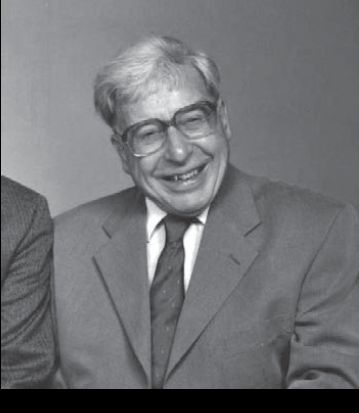
Physiology News Magazine
Obituary: Bob Edwards
1925 – 2013
Membership
Obituary: Bob Edwards
1925 – 2013
Membership
Martin Johnson
https://doi.org/10.36866/pn.92.53

Many obituaries of Bob Edwards have appeared in the few weeks following his death early on the morning of 10 April 2013. These set out his many qualities and achievements fulsomely and (almost) comprehensively. As I write this personal reflection five weeks after his death, there is one feature that I personally miss most about Bob not being ’here’. It is a feature that was barely mentioned by others (nor in an earlier piece in Physiology News by Richard Gardner written to mark the award of Bob’s Nobel prize) and by focusing on it here I hope to eliminate the ‘almost’.
I first encountered Bob in 1966 as he entered the Part 2 teaching room (now the Hodgkin Huxley Seminar Room) of the Physiological Laboratory at Cambridge to give us the first of eight lectures on Advanced Topics in Reproduction. I had little anticipatory enthusiasm, for the Part 1 lectures (not alas given by Bob) had been uninspired and full of ground squirrels, rabbits and lots of steroid biochemistry – with barely a mention of humans to pique the interest of an aspiring medical student like myself. As I recall it, Bob was (characteristically, as I was later to discover) a few minutes late and as he rushed in apologising he dropped his lecture notes and then gathered them up – apparently in random order – inconsequentially as it happened as he rarely seemed to consult them! After eight weeks of being variously challenged, irritated, impressed and amused by his futuristic vision of a reproduction that encompassed endocrinology, immunology, cell biology, ethics, developmental biology, politics, population studies, his beloved genetics and PEOPLE, I was hooked and inspired! And so I shelved my clinical course at Charing Cross Hospital and commenced a PhD with him that autumn – to the horror of most of the then academic staff in the laboratory who made it very clear that they considered Bob a ‘lightweight’ who worked on a distasteful subject (‘down there’ – as they put it), not an elevated one like the nervous system, and who – horror of horrors – actually spoke to the press and public about his work! Indeed, he was quietly delighted at the ironic twist that when the department was renamed recently; neuroscience took second place to development!
Bob was accustomed (as I was soon to find out) to this intellectual and social snobbery, which he greeted with his characteristic laugh and a smile. And it is that laugh that I miss so much, because that laugh became very familiar and reassuring over the years. However many travails that he faced, he never seemed to lose either his sense of proportion or his sense of humour. However bitter the attacks on him, however hurt he must have been, however desolate at his patients’ disappointments over those long years until Louise Brown was born, and the even longer years until his achievements were recognised with the award of the Nobel Prize in 2010, he was always able to muster a smile and a laugh – sometimes rueful, sometimes hopeful, but always warm and affectionate, and never at any one else’s expense. Bob’s laugh reflected his care for us all – his students, his patients, his colleagues, his family, his ideas and his world. The world is a much sadder place without it.
The Society also regrets to announce the deaths of:
Annie B Elliott
Vahe Amassian
Notices and full obituaries can be found The Society website at www.physoc.org/obituary-notices
